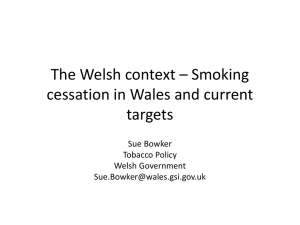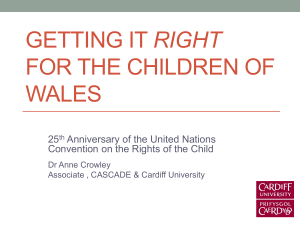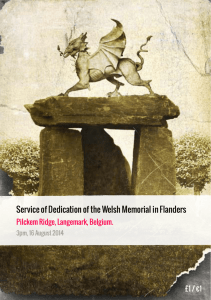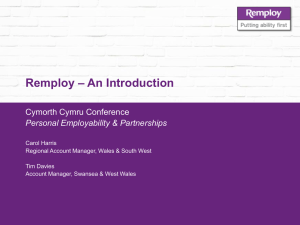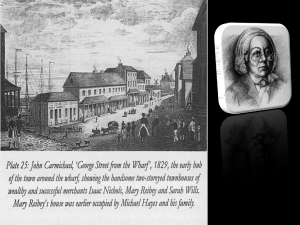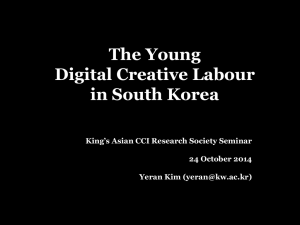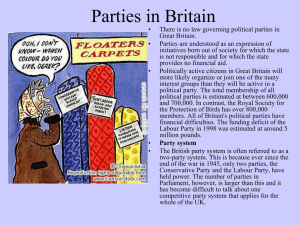Wales -Plaid Cymru and Nationalism
advertisement
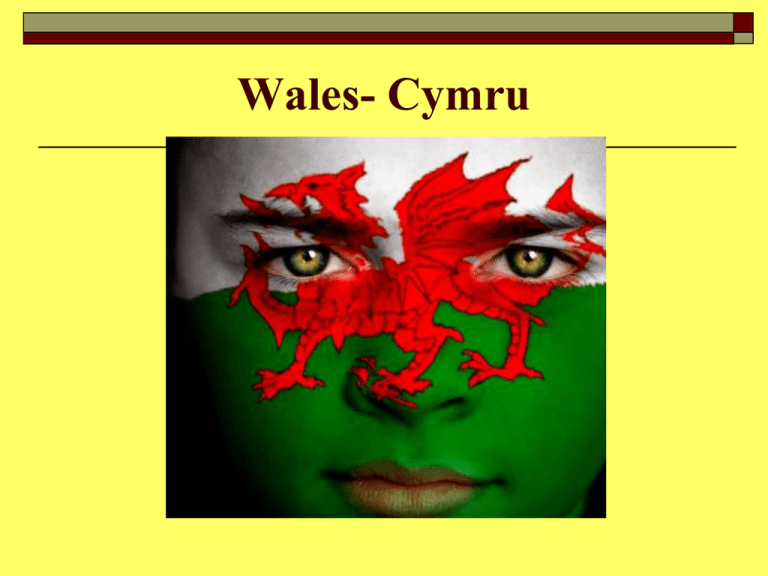
Wales- Cymru Welsh ‘radicalism’ Especially in the 19th century, but its influence pervaded the political life of 20th century Wales. Inicially, a movement to reform parliament. Also to oppose the Anglican church tax. Pacifism; wellfare state; leftist, lack of dogma In time this led some Welsh politicians and thinkers to socialism or/and nationalism. Welsh ‘radicalism’ Reflected in the social thinking of Welsh ‘non-conformity’. (decentralized Protestant religion in most of Wales in 19th-20th c) This movement, or tendency left its mark clearly on Welsh socialism and nationalism; and in fact developed into these ideas. The Labour Party (1900), and Plaid Cymru (1925) Wales: Charting the course of Welsh history in such a complex period as the 20th century is not an easy task. Industrialization: it was a mistake to depend almost entirely in SE and NE Wales on coalproduction. Lloyd George, Aneurin Bevan and James Griffiths- the socialist ideal in Wales. Welfare state. Wales: a quick look at the past 1920s The dominance of the (British) Labour Party in industrial Wales, and the declining Liberal Party in rural Wales. The beginnings of parliamentary nationalism. Plaid Cymru. Plaid Cymru- party or movement? Founded in 1925. For many years it had no impact on the electorate. Its most prominent figure before WWII was Saunders Lewis, he was its president between 1926-1939. Its political philosophy in the 1930s reflected his rather conservative outlook. Ambrose Bebb D.J.Williams Saunders Lewis Kate Roberts Plaid Cymru- party or movement? Amongst the aims of the party were dominion status for Wales, membership of the UN, and the creation of an economy based on the Welsh concept of perchentyaeth. (shared wealth, in an elitist society), and official status for the Welsh language. The political world in Wales was seriously upset by symbolic, direct action in 1936 (400 years after the Act of Union) The Fire in Penyberth Saunders Lewis in 1936 Lewis Valentine, Saunders Lewis and D.J.Williams Penyberth Farmhouse (as it was) The Penyberth issue 1935-Gov. announced that a bombing school would be set up on the site of an old farmhouse that had long associations with Welsh culture. Pacifism, a view of Christian Welsh Wales. 8 September 1936, part of the new buildings were set on fire by SL, DJ Williams and Lewis Valentine. The Penyberth issue Two trials: one in Caernarfon, the second in the Old Bailey (London). The three were imprisoned. When they were released in 1937, they were greeted by large (12,000) crowds of supporters. This symbolic act had a far-reaching effect upon the intellectual and political life of Wales. Wales: Saunders Lewis Saunders Lewis (1893-1985) and the language issue. 1951, 29% of the Welsh population spoke Welsh. 1962 the Tynged yr Iaith radio lecture which sparked off three decades of language activism. (Cymdeithas yr Iaith). http://www.youtube.com/watch?v=Bjl8LzXlTqg Welsh-medium education and S4C. Aftermath of Penyberth The hope had been that such an action would bring long-term success to Plaid Cymru. It didn’t. Eventually SL resigned as president. By 1945 Plaid Cymru had moved on. The new president Gwynfor Evans became the new iconic figure in nationalist circles. Growth in Welsh governance The major development in the 1960s was the creation of the Welsh Office (in London, and Cardiff). The first Secretary of State for Wales was James Grifiths 1964. Early SSforW were Welsh, by the time of Margaret Thatcher, they were mainly English. Gwynfor Evans (1912-2005) http://www.youtube.com/watch?v=nOFC2moJAus&feature=related Gwynfor Evans Gwynfor Evans’ approach was quite different to that of his predecessor, Saunders Lewis. He was more liberal in political terms, a pacifist. Plaid Cymru slowly gained greater support. In 1959 it was a much stronger party than the SNP (now the opposite is true). Gradually, support grew in the Labour-held SE of Wales. Gwynfor Evans . 1966- Gwynfor Evans won the first seat for Plaid Cymru in a by-election (for the Westminster Parliament). Others followed: Dafydd Wigley (1974) Dafydd Elis Thomas (1974) Wales:devolution Unlike the SNP, Plaid Cymru was slow to attract large numbers of supporters amongst the electorate. In 1974, 11%. 2001, 14% of the Welsh electorate. The first referendum in 1979 (rejected by the Welsh electorate) had a very negative effect on Plaid Cymru Devolution fiasco of 1979. Resounding ‘no’.yet, many people were now thinking of themselves as primarily Welsh rather than ‘British’. Between two referendums (1979-1997) During this period Britain was ruled by a right-wing Tory government for 18 years. For part of that time, the PM was Margaret Thatcher. Many of her policies were very unpopular: (closure of coal industry, proposed poll-tax), also increase in unemployment, and resultant social disintergration). Wales:devolution (1) The radicalizing effects of this period no doubt encouraged the desire for devolved government in both Wales and Scotland. As well as the situation in Northern Ireland, War in the Falklands/Malvinas. Later, after Labour was back in power, the 1997 devolution referendums had very different results. The promise made by John Smith (from Scotland), leader of the Labour Party. Wales:devolution (2) The 1997 ‘yes’ result in Wales. Strong support in areas that had suffered greatly during M Thatcher’s time: Gwynedd, Carmarthenshire, Neath/Port Talbot and the South Wales Valleys. Government of Wales Act 1998. Set up the National Assembly for Wales. From Welsh Office to Welsh Assembly As of July 1999, most of the powers invested in the Welsh Office were transferred to the Welsh Assembly. The Welsh Office became Wales Office. The Secretary for Wales (Ysgrifennydd Gwladol Cymru) Functions of the Wales Office today ‘The Secretary of State for Wales acts to ensure that the interests of Wales are fully taken into account by the UK Government in making decisions that will have effect in Wales, and to represent the UK Government in Wales. The Secretary of State for Wales is responsible for ensuring the passage of Wales-only legislation through Parliament. Departments should copy to the Secretary of State or the Wales Office all correspondence between UK and Assembly Ministers and between senior officials, especially when it relates to primary legislation’. Devolution With the success of the second referendum in 1997, Plaid Cymru entered a period of electoral success. In the first Welsh Assembly election (1999), Plaid Cymru gained 28.4% of the popular vote with 17 out of the 60 seats. It also gained control of parts of Wales in ‘council’ elections (Gwynedd, Caerffili, and Rhondda Cynon Taf). National Assembly for Wales, Cardiff 1998 Ron Davies: ‘Let no one think that now the devolution genie is out of the bottle he can be forced back in or that he won’t want to stretch his muscles’ (or her muscles?). Welsh representation: Cymru/Wales 4 MEPs 60 Senedd Members 40 Westminster members National Assembly for Wales 1998 60 members- 40 from the constituencies, 20 by the additional member system. The powers were much less than those devolved to Scotland. First Ministers so far: Alun Michael, Rhodri Morgan, Carwyn Jones. (Labour Party) Y Senedd/National Assembly Red=labour 30 Blue=conservative 14 Green=Plaid Cymru 11 Amber=Lib Dems 5 Wales in Westminster Labour Party 26 Conservative Party 8 Liberal Democrats 3 Plaid Cymru 3 Total 40 Y Senedd/National Assembly http://en.wikipedia.org/wiki/National_Assemb ly_for_Wales First Minister of Wales: Carwyn Jones (Labour) I’m pro-Wales, Labour Party member, Love the Assembly, Against Scottish Independence Uncertainty The president of PC Ieuan Wyn Jones resigned and his post was taken up by Dafydd Iwan (long-time language activist, businessman, local councillor). Yet, in the Assembly the leader of the party remained Ieuan Wyn Jones, and in Westminster Elfyn Llwyd. How is Plaid Cymru going to react to Scotland’s bid for independence? Further uncertainties In the 2005 Westminster elections, Plaid Cymru lost one of its seats In the 2007 Assembly election, PC only managed to uphold 15 seats (out of 60). The Welsh Labour Party gained 26 seats, but this was not enough to form a government. In the end, PC joined with Labour to form a coalition in Cardiff. Leadership race 2012 A Plaid Cymru leadership candidate said winning the next two assembly elections would give the party a mandate for a referendum on Welsh independence. Elin Jones signalled she would place Welsh independence at the centre of the party's election platform. Plaid Cymru: Elin Jones "There is a debate happening now in Wales, England and Scotland now about the future of the UK constitution - I want to see Plaid Cymru engaged fully in the debate in order to lead us to becoming a successful independent nation. "I'm clearly of the view that two consecutive victories for Plaid Cymru, just as with the SNP in Scotland, could trigger a referendum for independence in Wales." Scotland’s Independence bid Former First Minister Rhodri Morgan (Labour Party) said Wales would be worse off if Scotland left the Union. Mr Morgan said he was concerned about the implications for Wales of Scotland voting for independence. Plaid Cymru leadership race Elin Jones (frontrunner) Elin Jones


